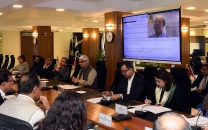Supreme Court establishes Overseas Litigants Facilitation Cell
Through OLFC, overseas Pakistanis can submit applications, complaints, and requests for early hearings
1724268870-0/Supreme-Court-of-Pakistan-(2)1724268870-0-640x480.webp)
The Supreme Court of Pakistan has established an Overseas Litigants Facilitation Cell (OLFC) in a significant step aimed at assisting Pakistanis living abroad in pursuing their legal matters before the country’s top court.
According to an official statement, overseas Pakistanis will now be able to approach the facilitation cell through a dedicated WhatsApp number (+92-326-4442444) and the court’s online complaints portal.
Recognizing the difficulties faced by overseas litigants in securing timely and convenient access to justice, CJP Yahya Afridi has taken notice of the matter and has established the Overseas Litigants Facilitation Cell (OLFC) with immediate effect. pic.twitter.com/JyKeAH8egi
— Hasnaat Malik (@HasnaatMalik) September 6, 2025
The court clarified that only cases falling under the jurisdiction of the Supreme Court will be registered with the facilitation cell. Every individual residing abroad will be considered an overseas litigant under this initiative. Overseas litigants will be able to submit applications and complaints directly to the apex court. The facility will also allow them to file requests for early hearings in pending cases.
Read More: IHC forms special bench for overseas Pakistanis' property cases
In addition, the court said that case details and certified copies of judgments will be made available online. The entire process will be digitised, with all records preserved electronically to ensure transparency and easy access.
Supreme Court said the establishment of the facilitation cell reflects the judiciary’s resolve to address these concerns. “This initiative reflects the judiciary’s commitment to ensuring that access to justice is not hindered by distance and that overseas litigants can effectively pursue their rights before the Supreme Court of Pakistan, ” the statement concluded.
According to Migrant Resource Centre, Pakistan has one of the largest expatriate communities in the world, with over nine million citizens living abroad. The diaspora contributes significantly to the country’s economy through remittances but has long faced difficulties in pursuing legal matters back home due to distance and bureaucratic hurdles.






















COMMENTS (1)
Comments are moderated and generally will be posted if they are on-topic and not abusive.
For more information, please see our Comments FAQ